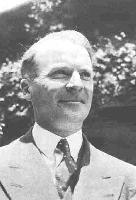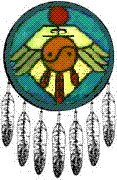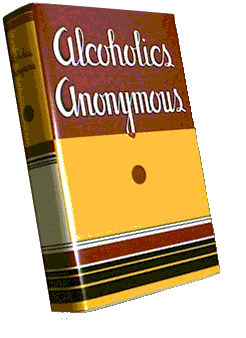
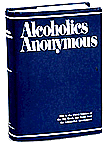
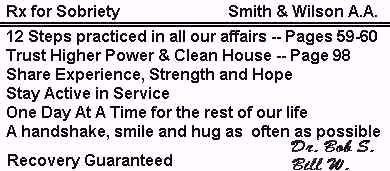 Click The Images To Go To Page Indicated
Hank Parkhurst - New York's AA #2 Hank Parkhurst was a salesman, an agnostic, a former Standard Oil of New Jersey executive, who had lost his job because of drinking and wound up at Towns Hospital, where Bill found him in the fall of 1935. He was Bill's first success in New York, the first alcoholic in New York to ever stay sober even for a little while. (He stayed sober for four years.) The first mention of Hank in the Big Book is on page xxix of "The Doctor's Opinion." He was the man Dr. Silkworth described who "seemed to be a case of pathological mental deterioration. ... He adopted the plan outlined in this book." One year later Dr. Silkworth didn't recognize him. He is also the man mentioned on page 136 who "was living in a large community." The community was Montclair, New Jersey, where Hank apparently had moved from Teaneck, New Jersey, where he was living when he first stopped drinking." Hank was a red haired, tall, broad-shouldered former athlete with a salesman's drive and enthusiasm. He had at least one new idea a minute, and plenty of energy. Judging from a picture of him posted on the Internet, he was quite a handsome man. After Hank got sober, he and his wife, Kathleen, traveled from Teaneck, New Jersey, every Tuesday to the meetings at the Wilson house in Brooklyn. So enthusiastic was Hank in his early sobriety that one night when Hank, Bill and Fitz Mayo ("Our Southern Friend") were driving down Park Avenue in Hank's convertible, Hank suddenly stood straight up, and grasping the steering wheel in both hands and with the wind beating against him, he yelled, "God! God almighty, booze was never this good." When Bill and Lois lost their home on Clinton Street, Brooklyn, it was to Hank's home in New Jersey that they moved. The entry in Lois's diary for that day read: "Left 182 for good. Went to Parkhursts." Lois said that when they moved to the Parkhursts, "Hank and Kathleen started holding Sunday meetings at their new home in Montclair, New Jersey, and Bert T. let us continue our Tuesday meetings [formerly held at Clinton Street] at his elegant Fifth Avenue tailor shop." By the time Bill and Lois moved out of Hank's house there were also AA meetings in Montclair and South Orange, New Jersey. A former agnostic, Hank came to believe in some sort of "universal power," but he lead the fight, helped by Jim Burwell, in the debate about God in the twelve steps, which resulted in the compromise "God as we understood Him" being adopted. Hank wanted to leave God out completely and refer instead to the "spiritual nature" of the recovery the steps were designed to bring about. Hank had an office at 17 William Street, Newark, New Jersey, which was "the headquarters for a rapidly failing business," according to Bill. The "rapidly failing business" was Honor Dealers, which Hank had conceived, according to one source, as a way of getting back at Standard Oil, which had fired him. His plan was to provide selected gasoline stations with the opportunity to buy gasoline, oil, and automobile parts on a cooperative basis. Ruth Hock's immediate impression of Hank when she interviewed for a job at Honor Dealers was "that he had a vibrant personality, that he was capable of strong likes and dislikes, that he seemed to be possessed of inexhaustible energy -- and that he liked to make decisions." Her first impression of Bill was that he was a person of slow, deliberate decisions and, she suspected, not much real interest in their service station business. Ruth remembered very little gasoline business being conducted there. A lot of people dropped in to discuss their drinking problems, and on more than one occasion she observed Bill and Hank kneeling in prayer by the side of Hank's desk with one of these visitors, an Oxford Group custom when seeking God's guidance. Hank ran the business as Bill became more and more involved in writing the Big Book, which he dictated to Ruth Hock. On page 149 of the Big Book chapter "To Employers," Hank mentions the "little company." He also mentions two "alcoholic employees, who produce as much as five normal salesmen." The two employees were, according to Lee C., Bill Wilson and Jim Burwell ("The Vicious Cycle"). It was largely Hank who was responsible for Works Publishing being created to publish the Big Book. He signed the stock certificates himself as "President." When Bill protested he said there was no time to waste, why be concerned with small details? Eventually a post office box was chosen in one of New York's downtown post offices as the most central point of the whole metropolitan area, Long Island and New Jersey included. And it seemed appropriate to establish an office near this post office. Backed by the book stockholders and by Ruth, Bill made the proposal. Henry, whose new job took him into western New Jersey, objected violently. He wanted to take the book business and Ruth wherever he went. According to Bill, "he was heavily beset with other problems, too." Bill may have been alluding to Hank's desire to get a divorce from his wife and marry Ruth Hock. Hank's return to drink was preceded by a period of increasing anger, depression, and paranoia, during which his life fell apart. He took a job in western New Jersey he didn't want, and his alienation from Bill and the others seems to have begun when he tried to take the Alcoholic Foundation's office, and Ruth Hock, with him. Ruth didn't want to go, and no one wanted to see the office moved. Hank had been in charge of Works Publishing's finances, and when called on to make an accounting, he was unable to produce any records to indicate where the money had gone. Apparently there was no clear line drawn between Honor Dealers, Works Publishing, and Alcoholic Foundation expenses, or even between expenses Hank incurred in conjunction with his Works Publishing activities and his personal expenses. When he was confronted with this at a stockholders' meeting, he became very resentful and began inventing stories about his office being robbed and his records disappearing. It was at this meeting that Dr. Silkworth saw signs of paranoia in Hank and soon warned Bill that he might become dangerous. Some blurring of the financial picture was inevitable when it came to Ruth Hock, who was simultaneously working for Honor Dealers, Works Publishing, and the Alcoholic Foundation, which were all headquartered in the same office. Ruth said that Hank was an impatient man who was trying to pressure Bill into a pace that wasn't Bill's way, so he became dissatisfied and critical of many of the things Bill did and believed. Part of his unhappiness, Ruth admitted, involved her. "Hank and I were interested in each other. I had at one time seriously considered marrying him." When Ruth finally decided not to, Hank blamed Bill. The Honor Dealers office eventually was closed, and the office for the Alcoholics Foundation moved to New York. Ruth Hock was moved to the New York office, as was the furniture. Eventually, the groups decided that the book profits should go to the Alcoholic Foundation, and that Bill and Hank should turn over their shares and those who had purchased shares were to sell them to the Alcoholic Foundation at par value. The fellowship would own and control the Big Book and all future publishing projects. Bill turned in his shares, but Hank, who by then had started drinking again, refused to do so. No one knows just when Hank started drinking, but Lois's diary for June 13 and 14 of 1939 indicates that Hank was fighting with his wife and was determined to divorce her. The entry for September 5 read, "Kathleen [Hank's wife] phoned to say she thought Hank was drunk." September 6 she wrote: "Hank drunk, phoned Bill in the afternoon." The September 7 entry noted that he was still drunk. The problem of Hank's stock was solved when one day he showed up "completely broke and very shaky," according to Bill. "He pointed out that most of the office furniture still belonged to him, particularly the huge desk and the overstuffed chair." The furniture had been paid for at least once before, but Bill agreed to pay him again if he would turn over his stock. He accepted two hundred dollars for the furniture and turned in the stock. But Hank resented Bill's persuading him to turn over the stock, and to make matters worse, soon Bill was granted a royalty on the book, similar to one that had already been voted for Dr. Bob. Hank's son said that Hank always felt he had been treated badly and that Bill had made a deal with the foundation that excluded Hank from any future share in the book's profits. The entire issue was clouded by the fact that Hank's drinking had put a wall between him and many members who eventually supported royalty payments for Bill. Hank wrote a memo to Bill in late 1939, which is quoted in full in "Pass It On." It asked questions that echo still today, questions about the separation of a moneymaking business and work for the love of it, about individualism and the cult of personality that was already beginning to gather around Bill and Dr. Bob. Hank asked: "Did Jesus Christ have an office? ... Would money that would be spent on an office be better spent for traveling expenses for people spreading the good news? Will there be a Grand Pooh-Bah of A.A.?" Some think that Hank wanted to be the "Grand Pooh-Bah of AA", evidence his making himself President of Works Publishing instead of Bill. Perhaps he was jealous of the attention Bill was getting as a founder of A.A. He wasn't the first and he would not be the last. Bill wrote him a courteous but reserved response, which is also quoted in "Pass It On." It implies that Hank was drinking at the time: "Another point -- the gang would like you to come back with us very much. It would be helpful to you, to them, and most helpful to me. Even with respect to the book, it is difficult to sell your suggestions and ideas to people who sometimes feel that you are no longer one of them." At any rate Hank finally broke down completely and went on a terrific bender, after four years of sobriety, and he "never again showed any real sign of recovery." Soon Hank went to Ohio and began spreading vicious tales attacking Bill Wilson. Bill was grateful that Dr. Bob and Anne Smith disbelieved his stories, but many, especially Clarence Snyder and Henrietta Seiberling (who had never liked Bill) did believe Hank's tales. In Cleveland, some started calling for Bill's exclusion from Alcoholics Anonymous and even accused him of financial trickery. In New York, they began hearing about several Cleveland groups that wanted to secede and break off all connection with Bill Wilson's brand of AA. Finally, these stories grew so out of proportion that Dr. Bob and Bill decided to go to a dinner in Cleveland to discuss the situation. When the dinner was over, the chairmen of various Cleveland groups ushered Bill and Bob into a hotel parlor, where they were met by an interrogation committee, a lawyer and a certified public accountant. The stories all came out. One claimed that he had talked to a trustee in New York and knew for a fact that the previous year Bill and Bob had divided sixty-four thousand dollars. While they were shocked, Bill and Dr. Bob had come prepared. Bill had brought with him a certified audit of all AA financial affairs from the very beginning. It showed that although Dr. Bob was supposed to receive a royalty on the book, he had got none -- everything had gone back into AA work. He still received a stipend of $30 a week from the fund John D. Rockefeller, Jr., had started, but that was all. Bill had been getting the same $30, and for the past year he'd been drawing $25 a week from the book company. His total income was $55 a week. The committee's accountant studied the statement, then read it aloud and testified to its accuracy. The committee apologized, and some seemed genuinely chagrined. They said they would squelch the insidious rumors, but this never entirely happened. And all this grief for Bill -- who did not hide his hurt -- was caused by Hank, the first man he had helped to get sober in New York and who had been his partner. Hank reportedly was at one time married to Clarence Snyder's sister-in-law (this must have been one of his several marriages after the divorce from Kathleen), and later Clarence worked with Hank selling porcelain mugs and figurines all throughout the 1940s. After Hank's divorce from Clarence's sister-in-law, the business finally went under and Clarence's association with Hank dissolved. Hank did get back on the program for a short time later on, and remarried Kathleen after several bad marriages. He died in Pennington, New Jersey, in 1954. Lois ascribed his death to drinking, and others have said he was also on pills. Sadly, it was apparently his disagreement with Bill that kept him from returning to the Fellowship. Despite Hank's return to drinking, and the pain he caused Bill, AA owes him a lot. Without Hank the Big Book might never have gotten off the ground. Ruth Hock said, "It wouldn't have been written without Bill, and it wouldn't have been published without Hank." Hank's story "THE UNBELIEVER" was in the first edition of the Big Book. SOURCES: "Alcoholics Anonymous"; "AA Comes of Age"; "Pass It On"; "Getting Better Inside Alcoholics Anonymous" by Nan Robertson; "Bill W.", by Francis Hartigan; "Not-God, A History of Alcoholics Anonymous", by Ernest Kurtz; "How it Worked -- the Story of Clarence H. Snyder and the Early Days of Alcoholics Anonymous in Cleveland, Ohio", by Mitchell K.; and private communications from Lee C. Compiled by Nancy O. Index of AA History Pages on Barefoot's Domain As in so many things, especially with we alcoholics, our History is our Greatest Asset!.. We each arrived at the doors of AA with an intensive and lengthy "History of Things That Do Not Work" .. Today, In AA and In Recovery, Our History has added an intensive and lengthy "History of Things That DO Work!!" and We will not regret the past nor wish to shut the door on it!!
KEEP COMING BACK!
On the Web July 27, 2001 in the Spirit of Cooperation Three mighty important things, Pardn'r, LOVE And PEACE and SOBRIETY |
